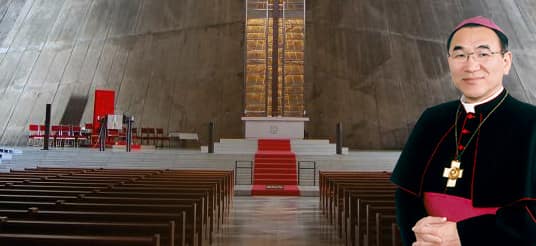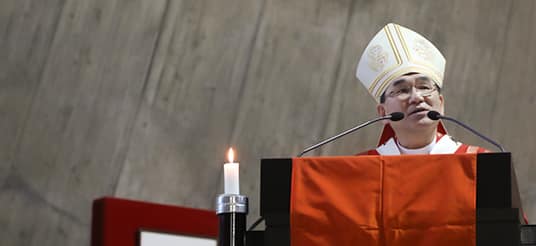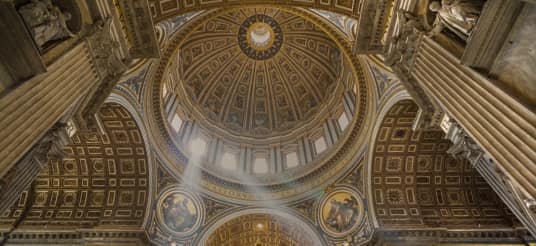Archdiocese of Tokyo

Homily for the Third Sunday of Easter at Kanda Church
14 April 2013
First Reading: Acts 5:27b-32, 40b-41
Second Reading: Revelation 5:11-14
Gospel: John 21: 1-19
(text)
After this, Jesus revealed himself again to his disciples at the Sea of Tiberias. He revealed himself in this way. Together were Simon Peter, Thomas called Didymus, Nathanael from Cana in Galilee, Zebedee’s sons, and two others of his disciples. Simon Peter said to them, “I am going fishing.” They said to him, “We also will come with you.” So they went out and got into the boat, but that night they caught nothing.
When it was already dawn, Jesus was standing on the shore, but the disciples did not realize that it was Jesus. Jesus said to them, “Children, have you caught anything to eat?” They answered him, “No.” So he said to them, “Cast the net over the right side of the boat and you will find something.” So they cast it, and were not able to pull it in because of the number of fish. So the disciple whom Jesus loved said to Peter, “It is the Lord.” When Simon Peter heard that it was the Lord, he tucked in his garment, for he was lightly clad, and jumped into the sea.
The other disciples came in the boat, for they were not far from shore, only about a hundred yards, dragging the net with the fish. When they climbed out on shore, they saw a charcoal fire with fish on it and bread. Jesus said to them, “Bring some of the fish you just caught.” So Simon Peter went over and dragged the net ashore full of one hundred fifty-three large fish. Even though there were so many, the net was not torn. Jesus said to them, “Come, have breakfast.” And none of the disciples dared to ask him, “Who are you?” because they realized it was the Lord.
Jesus came over and took the bread and gave it to them, and in like manner the fish. This was now the third time Jesus was revealed to his disciples after being raised from the dead.
When they had finished breakfast, Jesus said to Simon Peter, “Simon, son of John, do you love me more than these?” He said to him, “Yes, Lord, you know that I love you.” He said to him, “Feed my lambs.” He then said to him a second time, “Simon, son of John, do you love me?” He said to him, “Yes, Lord, you know that I love you.” He said to him, “Tend my sheep.” He said to him the third time, “Simon, son of John, do you love me?” Peter was distressed that he had said to him a third time, “Do you love me?” and he said to him, “Lord, you know everything; you know that I love you.” Jesus said to him, “Feed my sheep. Amen, amen, I say to you, when you were younger, you used to dress yourself and go where you wanted, but when you grow old, you will stretch out your hands, and someone else will dress you and lead you where you do not want to go.” He said this signifying by what kind of death he would glorify God. And when he had said this, he said to him, “Follow me.”
Dear Brothers and Sisters of Kanda Parish! Happy Easter !
Since you have a new pastor, I wanted to come and give you my personal greetings, and like on a sudden inspiration, I am visiting Kanda Church today. Later I will talk more with you.
Today, let’s take up the last part of the Gospel. The risen Christ asked Peter three times: “Simon, son of John, do you love me more than these?” (21:15) “Simon, son of John, do you love me?” (21:16) “Simon, son of John, do you love me?” (21:17)
Peter was sad on being questioned the same way three times. We may think that the reason why Jesus persisted in asking three times reflects the fact that Peter had said three times that he didn’t know Jesus, thus denying his relationship with him. This incident of denial remained very deep in Peter’s heart. To put it in modern-day language, wasn’t it something like a “trauma” for him? Peter then answered from the depth of his heart: “Lord, you know everything. You know that I love you.” (21:17)
When Jesus asked, “Do you love me?” the original Greek word for “love” in the Gospel is “agapas.” This is a verb, and the noun form is the well-known “agape.” Generally, the word for “love” in the New Testament is “agape.” However, the word in Peter’s answer was “phileo.” This also means “I love,” but it is a word that represents the fraternal friendship between humans.
Jesus’ first and second questions used “agapas,” but both times Peter answered saying “phileo.” The third time Jesus used the word “phileis” instead of “agapas.” “Simon, son of John, do you love me?” (21:17). Here I feel the tenderness of Jesus. When the Love-Agape of God is transmitted to human beings, it also becomes human Love-Philia (1). Jesus loved his disciples with his human heart, with a warm love that passes through the human blood. Jesus as a man loved Peter with a human heart.
Jesus said to Peter, “Feed my lambs.” (21:15) “Tend my sheep.” (21:16) “Feed my sheep. Amen, amen, I say to you, when you were younger, you used to dress yourself and go where you wanted, but when you grow old, you will stretch out your hands, and someone else will dress you and lead you where you do not want to go.” (21:17-18)
Jesus commanded Peter to take care of his sheep. The Good Shepherd is ready to sacrifice his life for his sheep. Ezekiel, the Old Testament prophet denouncing bad shepherds speaks as follows: “Woe to the shepherds of Israel who have been pasturing themselves! Should not shepherds, rather, pasture sheep?” (Ezekiel 34.2)
Good shepherds pasture the flock. Bad shepherds feed themselves, that is to say they “exploit the sheep to their own advantage.” The good shepherd heals and comforts the sick, encourages those in doubt, strengthens the weak, shows hope to those who are disappointed.
What the shepherds of the Church of Jesus Christ must do more than anything is to lead to an encounter with the risen Lord Jesus all people who are depressed and people who are lost. They must teach and encourage them to obtain strength and light from Christ.
Peter answered with love to the call of Jesus “Feed my sheep,” and was martyred on Vatican Hill in Rome (2). The successor of Peter is the bishop of Rome. The new bishop of Rome, Pope Francis himself, shows by his example that a shepherd should be a shepherd for poor people, for people who suffer and are in trouble, who are despised and discriminated against, for people who suffer in loneliness.
Let us pray for the guidance of the Holy Spirit so that our Tokyo Archdiocese may be an oasis for people who suffer and are in trouble amid the wilderness of this modern age.
Notes:
(1) The word “Philia” for love, is usually translated as “friendship” or “affection”
(2) The hill in the northwest of Rome, over the right bank of the Tiber River, is referred to as the “Vatican.” On this hill the tomb of the Apostle Peter was erected. Here a basilica to commemorate Peter, “St Peter’s Basilica,” was built by Constantine, the emperor who officially recognized Christianity. It is said that later this place became the residence of the Popes, the bishops of Rome and successors of St Peter. There they lived, had their office, and did pastoral work. Also the name “Vatican” given to the Holy See is derived from the place name of this “Vatican Hill.”





